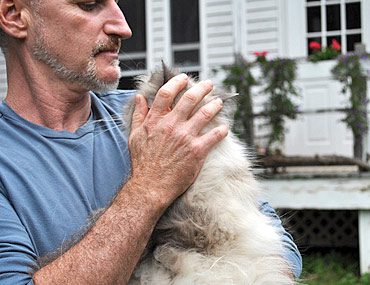Overview
Cats and dogs with long hair have a lot of grooming matters to attend to—and that includes paying close attention to the long hair on their hindquarters. Unfortunately, the hair near the anus can become matted with feces, creating not only an unpleasant odor but also a health risk. The fancy name for this condition is pseudocoprostasis, but it is more commonly known as a fecal mat. When left unattended, fecal mats attract flies that lay eggs, resulting in a maggot infestation. In some situations, the mat can become significant enough to obstruct the opening of the anus.
If the mat of hair blocks the passage of feces, it becomes extremely difficult for the dog or cat to defecate and can be very painful. This condition is most common in longhaired pets who have suffered a bout of diarrhea.
 Symptoms
Symptoms
- Straining to defecate
- Scooting
- Foul or fecal odor
- Large amount of matted hair around anus
Diagnosis
Your veterinarian will make a diagnosis based on a physical exam. If your furry friend is suffering from diarrhea, they may recommend tests to identify the cause.
These may include:
- Specific tests to rule out viral infections, such as parvovirus
- Fecal tests to identify if fecal parasites could be the cause
- Additional diagnostic tests specific to your pet’s symptoms
Treatment
The most important treatment in this situation is to remove the fecal hair mat. DO NOT CLIP THE AREA WITH SCISSORS! Washing the matted hair with warm water to remove the feces or shaving the area and then removing the mass with clippers is the safest way to ensure your four-legged friend will not be cut during the process of removing the matted hair.
Your veterinarian may prescribe medication to treat the skin around the anus, if it is irritated or infected. If there is a maggot infestation, your veterinarian will treat that, as well.
Prevention
The key to preventing this condition is stopping the fecal material from becoming matted in the hair. Frequent cleaning of the anal area may be necessary for some longhaired pets, especially if you notice diarrhea.
If you have any questions or concerns, you should always visit or call your veterinarian – they are your best resource to ensure the health and well-being of your pets.
